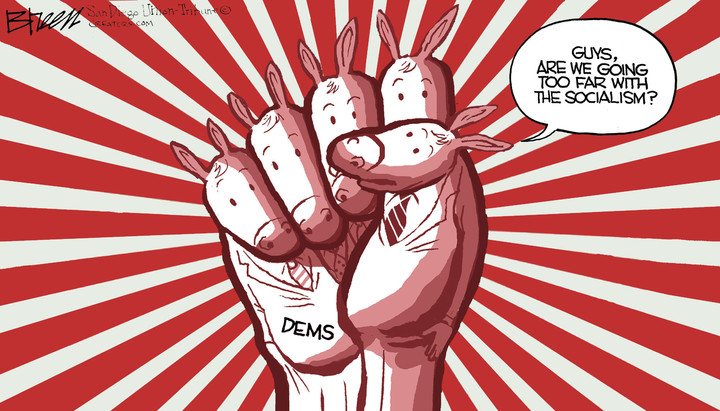
ABC moderators replowed familiar ground on health care but managed to conduct the most substantive debate so far. (Though once again foreign policy got short shrift.)
The opening remarks were more noteworthy than normal. Sen. Kamala Harris, D-Calif., smartly talked directly to President Donald Trump, excoriating him for divisiveness. She ended, "And now, President Trump, you can go back to watching Fox News." Sen. Amy Klobuchar, D-Minn., also defined her candidacy better than she has done to date. "If you feel stuck in the middle of the extremes in our politics and you are tired of the noise and the nonsense, you've got a home with me," she said. "Because I don't want to be the president for half of America - I want to be the president for all of America."
What was most striking was the strength of the moderate wing of the party, and the inability or refusal of the two most progressive candidates to directly respond to questions about the cost and logistics of Medicare-for-all.
Former vice president Joe Biden, still the front-runner, needed to show that his shaky debate performance in June was a fluke and that he has the stamina to go for three hours. He started strongly, ably defending the public option and indignantly insisting his plan would protect anyone with cancer. He had another strong moment in tipping his hat to Beto O'Rourke for his leadership in the wake of the El Paso, Texas, mass murder. Without rancor he also admonished Harris on the constitutionality of an executive order to ban assault weapons.
His weakest moment ironically was on Afghanistan and Iraq, where he tried to explain his vote for the use of force in Iraq and suggested he was for a partition of Afghanistan. (His plan was to soft-partition Iraq.) But two hours into the debate, it's not clear how many voters were watching or picked up on the point. Another failure - not just Biden's, but the entire field's - was their refusal to take Trump to task for inviting the Taliban to Camp David. It was a missed opportunity that suggests they are fearful of painting (correctly) Trump as weak and endangering Americans' security.
Biden's strongest moment may have been at the end when asked about resilience. Waiting out hecklers he told the story of losing his daughter and first wife and later losing his son Beau. He spoke about finding "purpose," reminding us why so many Democrats love the guy.
One can always count on Sen. Bernie Sanders, I-Vt., to deliver the same message, at the same volume, in the same emphatic way. Unfortunately, his voice was especially raspy, giving him the appearance of a man even older than his 78 years. Despite being caught in the polls this summer by Sen. Elizabeth Warren, D-Mass., he did not alter his routine. On foreign policy, he touted his votes against the Iraq War and every defense budget. He only reinforced the sense he would be the foil Trump would use to call Democrats weak.
Warren had as much to lose as Biden in this one, because she has been moving up and hence became a target for the rest of the field. She also had the first opportunity to face a phalanx of moderate candidates who, among other things, defend a public option for the Affordable Care Act rather than a single-payer heath-care system. Surprisingly she chose again to filibuster rather than squarely answer the question. She rallied to throw red meat to the base, promising to get rid of the filibuster.
However, given the number of people on the stage, she had long stretches in which she disappeared while Biden held his place in the center (physically and ideologically).
Harris certainly was looking for a "comeback kid" performance in which she could dispel media buzz suggesting she was slumping and at risk of losing donors. In the health-care debate, she aptly defended her plan to allow Americans the choice of whether to opt into Medicare. (Sanders and Warren could not answer why giving people a choice was a problem.) She also blew the whistle on the bickering, again reminding voters that the real problem was Trump who is aiming to destroy Obamacare.
When it came to trade, Harris proclaimed herself not to be a protectionist Democrat, and analogizing Trump to the "little dude" behind the curtain in the "Wizard of Oz." At the close, Harris shared the times she has been told that people like her wouldn't get elected or it's not her turn. Pivoting to the young people she talked to on the trail, she effectively made the point that as a groundbreaker she is plowing the path for those who will follow.
Klobuchar had one of her best moments of the campaign in her opening remarks. Like Harris, Klobuchar shined in the health-care portion of the debate. She said bluntly, "While Bernie wrote the bill, I read the bill and on page 8 ... it says that we will no longer have private insurance as we know it." She added, "I don't think that's a bold idea. I think it's a bad idea." She also played peacemaker in the gun debate when she pointed out all the candidates support banning assault weapons and background checks. She turned the argument to attack Majority Leader Mitch McConnell, R-Ky., who refuses to bring gun legislation to the floor.
Finally, she hammered Trump on his erratic, unfocused tariff war. She made a smart case that as someone from the Midwest she can talk to the heartland in a different way. Her closing was one of her strongest moments as she shared her story growing up with an alcoholic father and then her daughter's rocky birth, which started her career in politics. She was heartfelt and demonstrated the "grit" she promised to bring to the office.
Julián Castro had a jaw-droppingly awful moment, accusing Biden of not remembering what he said a few minutes earlier and then claiming he, not Obama's vice president, was Obama's true heir. It was a callow, nasty moment in a race in which many Democrats have been pleading with candidates not to attack one another. Everyone else seems to get it, but not Castro.
O'Rourke also had a strong night, opening with an impassioned statement on gun violence and needing to remove a president who induce hatred. His biggest moment was also his most controversial - a plan for mandatory buybacks. The audience ate it up, but unlike his otherwise moderate positions, it will be problematic in a general election.
For reasons that are not entirely clear, Sen. Cory Booker, D-N.J., and South Bend, Indiana, Mayor Pete Buttigieg tended to get lost in the shuffle. They weighed in to make pitches for unity, but otherwise lacked moments that set them apart from the crowd.
Andrew Yang began with a wild plan to give 10 people $1,000 a month to simulate his guaranteed income plan. It's not even clear that would be legal, but it was clearly ridiculous, prompting an incredulous reaction and laugh from Buttigieg.
It's worth remembering that beyond initial media reviews, we've seen no evidence that debates fundamentally shift the race. That's good news for the losers and disappointing news for those who performed well.
Winners: Biden, Harris, Klobuchar, O'Rourke, ABC.
Losers: Castro, Sanders, Warren, three-hour debates.
Sign up for the daily JWR update. It's free. Just click here.
(COMMENT, BELOW)


 Contact The Editor
Contact The Editor
 Articles By This Author
Articles By This Author